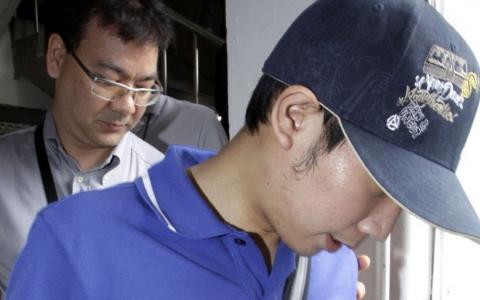
Hit-and-run cop killer is now a man without a country, but he’s still got a $12 billion dynasty to back him up. While letting complex cash shelters come to light isn’t ideal, they were built for circumstances like this.
The heir apparent of the third-richest family in Thailand has been fighting a hit-and-run manslaughter charge in and out of court since 2012. Now it looks like he’s given up on the courts going his way.
”Boss" Yoovidhya dumped one of the family jets in Singapore a few months ago and is now missing. Thailand has revoked his passport, leaving him unable to cross borders legally.
He’ll be fine. A complex network of shell companies literally powered by Red Bull — grandpa invented it — is apparently already trickling cash his way, wherever he is.
Thailand would love to cut off the funding and ultimately force the 32-year-old refugee to face trial. But they can’t.
This is exactly what offshore vehicles are supposed to do. While it may not be pretty or elegant, it’s a pragmatic and proven way to support the family when for one reason or another their homeland becomes antagonistic.
Outside the local legal grip
Once “Boss” went on the run, forensic accountants went back to the Panama Papers to see where he might draw support from the $12 billion Yoovidhya empire.
As it turns out, the family holds its 51% stake in Red Bull via a circular network of investment shells domiciled in the historical tax havens of Jersey and the British Virgin Islands, a long way from Thai jurisdiction.
Some of the shells own planes like the one that brought “Boss” to Singapore. Others own London townhouses like the one he’s probably hiding out in now.
As the shells trade assets, loan each other money and then cancel the loans, enough cash can get lost to pay the prodigal heir’s petty cash requirements.
There’s very little “allegedly” about the crime here. His Ferrari hit a motorcycle cop and dragged him across Bangkok. He acts like a guilty man — and in traditionally gentle Thailand, shame is its own punishment.
But in more ambiguous scenarios where wealthy people need to flee a hostile government, overseas cash becomes a literal lifeline. It’s why nervous Chinese millionaires are buying U.S. real estate and why people like Peter Thiel pay extra for a New Zealand passport.
The right trusts can provide the necessary combination of privacy and cash flow.
If there’s any hint that your more dynastically minded clients will ever need that kind of emergency liquidity, it doesn’t hurt to discuss the options and take the necessary steps.
There aren’t a lot of legal ways to hide from the U.S. Treasury, don’t get me wrong. Global anti-money-laundering rules and tax treaties ensure that Washington will be able to see dollars flowing overseas and tax it accordingly.
However, there’s a big difference between having to pay tax on assets wherever they’re located and being cut off from vital funds when you cross the wrong border. The first outcome is simply reality, the cost of doing business in modern times.
The second could tip the balance between survival and disaster if an heir gets into trouble. Many families insist on doing everything by the book. Others value flexibility over compliance.
The Yoovidhyas evidently follow the second approach. They’ve kept “Boss” circulating for five years now while their lawyers stall the process at home every way they can.
They’ve almost run out the statute of limitations on the minor charges, which only carried a maximum 6-month sentence anyway.
Taking the long view
Riding out the manslaughter charge will apparently take another 10 years. In the meantime, extradition is vanishingly unlikely even if Bangkok can pinpoint where the “Boss” is hiding.
He might be traveling under a fake passport — $12 billion can buy a lot of legitimacy from countries willing to look the other way — or just daring Thailand to demand his return.
Of course he’ll need to mind his manners. He’s lost all legitimate immigration status so if he gets in trouble again, it’s big trouble.
Maybe over the intervening decade he’ll be able to acquire citizenship somewhere else. We’ve seen rules bend for wealthy people in the recent past, so nothing’s really off the table here.
People like Peter Thiel have already picked up dual passports proactively in the event they need to hedge their residence at some point in the future.
Wealth managers talk a lot about hedging sovereign exposure, generally with the assumption that clients will remain at home as subjects to a more-or-less constant domestic environment.
We diversify the portfolio with non-dollar assets like foreign currency and stocks. But if clients are wealthy enough, it may be worth making sure some of that wealth is directed toward ensuring that the family can pick up and start over somewhere else.
I often think of the story of how the Swiss built their economy to survive even if every person in the country dies and every square inch of territory is rendered unlivable. The offshore assets will go on, robust enough to maintain the idea of “Switzerland” and one day maybe rebuild.
That’s the bona fide gold standard for planning in perpetuity. Your clients may not be interested in that level of risk management — in a lot of ways, it’s alien to basic human feelings and relationships — but you never know until they ask.
And if their kids get into trouble, they’ll need to make hard decisions. It’s best to talk through those decisions in advance so the structures are in place when and if they need to be.
Thailand has changed a lot in the last few decades. The Yoovidhyas need to make sure they go on whatever happens to their country of origin. They’re protecting their kids, whether they deserve it or not.



